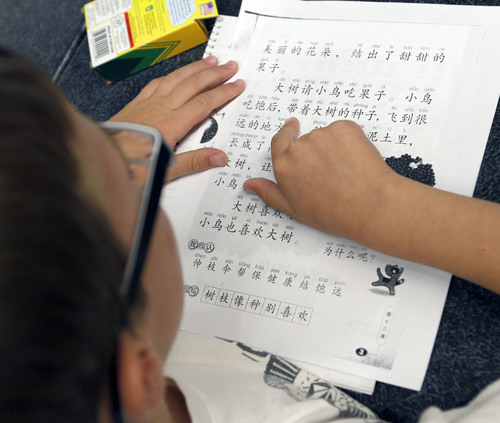This is an archived article that was published on sltrib.com in 2014, and information in the article may be outdated. It is provided only for personal research purposes and may not be reprinted.
Building on the success of Utah schools' dual language immersion program, two sons of the state senator who wrote it into law are working to launch a foundation to spread it to other areas of the country.
The effort began earlier this year, when Chinese business leaders offered donations after hearing Sen. Howard Stephenson speak in Philadelphia about government and the language program.
The business leaders were traveling around the U.S. as part of a trip the senator's son, Dan Stephenson, helped lead as a strategic relationship consultant for Bennett Group International and Hero Partners. Dan Stephenson, 37, spent more than nine years studying and working in China.
"These Chinese business leaders became very excited and some of them even emotional, and unbidden and unsolicited, several of them stood up and expressed their support for the promotion of Chinese dual language immersion in the U.S.," Dan Stephenson said.
The foundation won't receive any state money, and Howard Stephenson, a Draper Republican, said he won't profit from it himself. Whether his sons will draw salaries from the foundation is still unknown, said Dan Stephenson.
Neither sees a conflict of interest with the idea.
"I don't see any conflict at all," Howard Stephenson said. "They have a passion for assisting with the success of Chinese instruction in Utah and throughout the nation, and I don't think that's anything but positive."
Dan Stephenson has similar feelings.
"I think it's a huge advantage to push our successes in Utah," Dan Stephenson said. "Children have more of an opportunity to learn another language, to understand a different culture, to understand the world and create more opportunity for themselves in future careers. I see that as a huge advantage and I don't see that as a conflict of interest whatsoever."
Thad Hall, a University of Utah political science professor, also said he sees no problem with the arrangement. He said such connections tend to be common in part-time legislatures like Utah's, where lawmakers often have jobs outside their public service.
"I don't think there's anything wrong with his sons spreading or touting this program as long as they're not getting paid by the state to do that," Hall said.
He said the only questionable situation that could arise would be if politically connected people started giving money to the foundation in hopes of currying favor with Howard Stephenson.
Dan Stephenson said no politicians have committed money to the foundation, and the foundation isn't seeking any money from them. So far, the nonprofit foundation has received hundreds of thousands of dollars of funding commitments, but no actual money yet, from the Chinese business leaders and people in the U.S., he said.
The organization, called Zi Chinese Dual Language Immersion Foundation, is still getting off the ground.
The foundation's mission will be to spread dual immersion programs to other states.
As part of the program, often starting in first grade, students spend half the school day with an English-speaking teacher and the other half with a teacher who speaks entirely in a foreign language — such as Spanish, French or Mandarin Chinese — focusing on various subjects in each language. By sixth grade, students are expected to be fluent in both languages. The idea is to teach kids while they're still young enough to learn foreign languages easily.
The program started after Howard Stephenson wrote it into a bill that passed into law in 2008. He said about 13,000 Utah kids are now learning Mandarin, and he expects that number to reach about 30,000 within six or seven years.
In addition to working with his brother, Andy Stephenson, on the foundation, Dan Stephenson is also working with his Shanghai-based business partner and Shanghai Jiao Tong University.
Dan Stephenson said he's not yet sure what role he and his brother will hold in the foundation, which will be based out of Salt Lake City and Shanghai.
"I see it as trying to push out the Utah model and show other states and school districts around the country the cost-effective nature of the Utah model," he said, "and how for a really minimal amount of money, in terms of the overall budget, there can be a really impactful program like dual language immersion that will have, in my opinion, a direct economic benefit for that student in the future."





